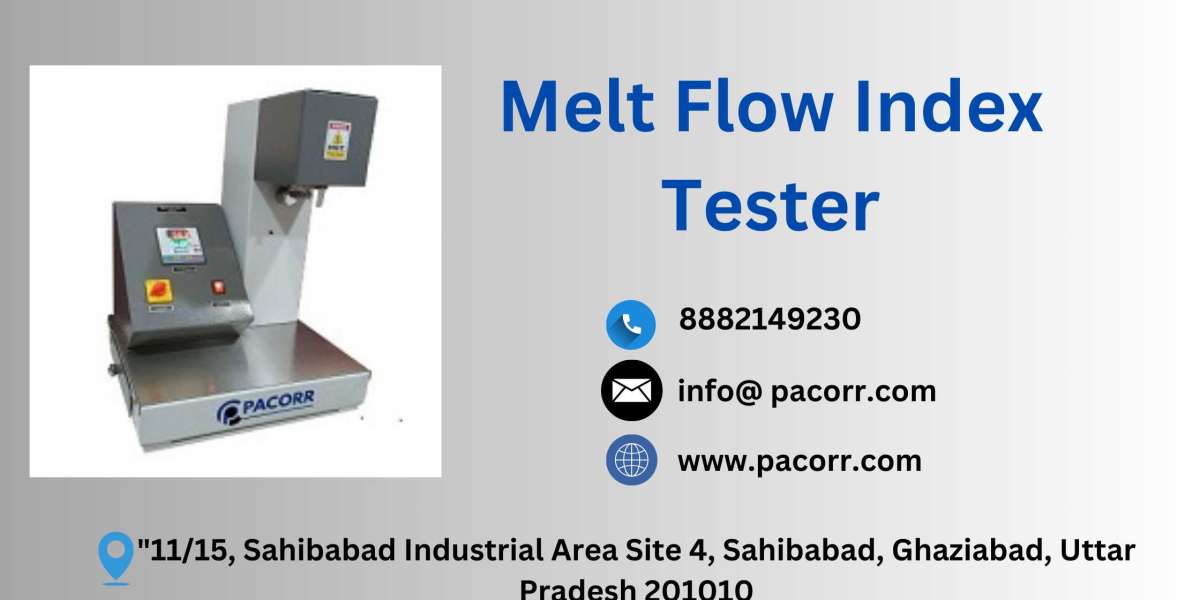Melt Flow Index Tester: A Vital Tool for Polymer Testing
In the polymer and plastics industry, maintaining the quality of raw materials is crucial for ensuring optimal product performance. One essential instrument that helps in this process is the Melt Flow Index Tester. At pacorr.com, we offer high-quality Melt Flow Index Testers designed to measure the flow rate of melted plastics, which is critical in determining material properties like viscosity, elasticity, and molecular weight. This article aims to educate readers about the importance, applications, and features of the Melt Flow Index Tester, highlighting its role in quality control for polymer manufacturers.
What is the Melt Flow Index Tester?
The Melt Flow Index Tester Price is a precise testing instrument used to evaluate the flowability of thermoplastic polymers. The test determines the rate at which molten plastic flows through a specified die under controlled temperature and pressure. This measurement, commonly known as the Melt Flow Rate (MFR), is essential in understanding the polymer's processing characteristics, which directly affect the production quality of plastic products.
Importance of Measuring Melt Flow Index
The Melt Flow Index (MFI) is a key indicator of a polymer's molecular structure and performance. Knowing the MFI helps manufacturers assess the material's ability to mold into specific shapes and ensures the polymer’s suitability for different production processes. For example:
- High MFI: Indicates that the material flows easily, making it ideal for high-speed manufacturing processes like injection molding.
- Low MFI: Suggests that the material is more viscous, which is suitable for processes requiring high mechanical strength, such as extrusion.
Testing the Melt Flow Index is crucial for maintaining product uniformity, quality control, and production efficiency.
Applications of Melt Flow Index Testing
The Melt Flow Index Testing plays a critical role in multiple industries, especially those dealing with polymers and plastics. Some of the primary applications include:
- Plastic Film Manufacturing: Ensures the consistent thickness and quality of films used for packaging.
- Injection Molding: Verifies the material’s flow properties for smooth production of molded parts.
- Extrusion Processes: Monitors polymer viscosity to achieve uniform extrusion in pipes, sheets, and cables.
- Automotive Industry: Ensures that plastic parts used in vehicles meet safety and performance standards.
- Recycling Sector: Helps assess the quality of recycled plastic by measuring its flow properties.
Key Features of Pacorr's Melt Flow Index Tester
At pacorr.com, we offer advanced Melt Flow Index Testers that come equipped with a range of features designed to deliver accurate and reliable results:
- User-Friendly Interface: Our machines are designed for ease of use, allowing operators to perform tests efficiently with minimal training.
- High-Precision Sensors: These ensure the accurate measurement of melt flow rates, providing critical data for quality control.
- Temperature Control System: The testers feature an advanced temperature control mechanism, which ensures consistent testing conditions for reliable results.
- Durable Construction: Pacorr’s Melt Flow Index Testers are made with high-grade materials that ensure longevity and low maintenance costs.
- Automated Functions: Some models offer automatic sample cutting and timing, further improving the ease and accuracy of tests.
- Computerized Models: For enhanced functionality, Pacorr offers computerized models that integrate data collection, analysis, and reporting, simplifying the testing process.
How the Melt Flow Index Tester Works
The operation of the Melt Flow Index Tester is simple but highly effective. The process involves:
- Sample Preparation: A small amount of the polymer sample is placed inside the heated barrel of the tester.
- Controlled Heating: The sample is heated to a pre-set temperature, usually between 190°C and 300°C, depending on the material being tested.
- Application of Load: A specified weight is applied to the molten polymer, forcing it through a capillary die.
- Flow Measurement: The amount of material extruded in a given time (typically 10 minutes) is measured, and the Melt Flow Rate (MFR) is calculated.
- Data Analysis: In computerized models, the data is recorded and analyzed automatically, providing users with comprehensive test results.
Benefits of Using a Melt Flow Index Tester from Pacorr
Using a Melt Flow Index Tester Price from pacorr.com offers several advantages for manufacturers:
- Improved Quality Control: Regular testing helps maintain consistent material quality, reducing product defects and waste.
- Enhanced Efficiency: Accurate MFI data enables manufacturers to optimize production processes, saving time and costs.
- Regulatory Compliance: MFI testing ensures that materials comply with industry standards, such as ASTM D1238, helping companies meet regulatory requirements.
- Cost Savings: By identifying variations in polymer properties early in the production process, companies can avoid costly production halts and material wastage.
Conclusion
The Melt Flow Index Tester is a vital tool for any company working with polymers or plastics. Its ability to provide accurate measurements of material flow properties ensures that manufacturers can produce high-quality, consistent products. Whether you're in the automotive, packaging, or recycling industries, investing in a high-quality Melt Flow Index Tester from pacorr.com will help you maintain rigorous quality control, improve process efficiency, and meet industry standards.



